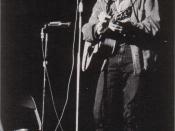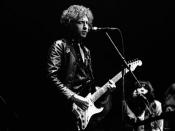Throughout history, music has been a form of communication, a medium that is understood by the masses. Form the drumbeats of the Swahili and Navajo to the Guitar riffs of Chuck Berry and crooning of Bing Crosby, most of what their music represents is the need to convey a message of some kind. Whether it is a sign of the times, as with the formation of rock and roll or the need to warn other tribes that trouble is coming over the horizon, music and its many manifestations have been used as a form of popular communication. Many events in history are marked with the music from the time. Each big event worth talking about in a history book usually has a song to commemorate its occurrence. Many times music will reflect public opinion as with the patriotic tunes of World War I and the anti-war music of the Vietnam era.
It is obvious that opinions on war changed in just a few decades. The two songs from the World War I era give two distinct views. In one instance the patriotism that the government would want the public to have is very prominent in George M. CohanÃÂs ÃÂOver ThereÃÂ. As the song begins we can hear the flutter of the fife and the semblance of a march which at times can have patriotic connotations due in part to John Phillip Souza and his ÃÂStars and Stripes foreverÃÂ. In ÃÂOver ThereÃÂ, just before the words begin, an army bugle call is heard, which carries throughout the song. This particular song seems to be a sales pitch to enlist in the army. Johnny is supposed to go and make his daddy proud by rolling up his sleeves fastening his bayonet flexing his muscles and showing the Hun who is boss for the sake of Europe. During the time of WWI this was a classic attitude to have. This song seems designed to catch the ear of the common man of the time. It has a catchy rhyme scheme, a quick beat, simple words and it tugs at our patriotic heartstrings.
At the time of World War I, the United States made an attempt at being neutral. However, in 1917, Great Britain uncovered a plot to have Mexico declare War on the United States and in return, Mexico would have German support in the reclaiming of Texas, New Mexico, and Arizona. The decrypted correspondence was known as the Zimmerman Telegram. A cynical plot had been set in motion to halt American involvement and for Germany to tighten its chokehold (World War I 2007). It appeared that Germany was guilty of a crime of passion rather than necessity in its attempt to control Europe. ÃÂOver ThereÃÂ was written with these situations in mind. It seems to be a positive rallying cry for the young men of the United States to, ÃÂShow your grit, do your bitÃÂ. Considering the turn of events that involved the United States in World War I, the patriotism was justified. If not for these tunes and the brave young men that answered the call to duty, the world may have turned out drastically different.
Despite the service that songs like ÃÂOver ThereÃÂ provided, there is always a flip side to the coin and ÃÂover thereÃÂ becomes something radically different. Some would call it semantics but Charles IvesÃÂ ÃÂTom Sails AwayÃÂ puts the war in a different context. Over there is no longer where Johnny is going to help the less fortunate and victimized but where Tom is going. Not everyone was proud and wanted their son to go off to a foreign land, and Tom leaves sorrow in the wake of his ship across the Atlantic and maybe Tom never came home. Of course, Ives has a different angle to his music and it is certainly not written for the common man as ÃÂOver ThereÃÂ was. IvesÃÂ music is designed for a different kind of ear, one that ÃÂhearsÃÂ what he is saying and the different levels in which his message is being conveyed. Intellectuals are seldom gung ho in matters regarding war and I believe that Ives exemplifies this in ÃÂTom Sails AwayÃÂItÃÂs interesting to ponder that in a matter of decades our political music took a turn off the beaten path. There have always been pacifists and those that would oppose war no matter the price but the people usually stood behind the United States government in its decisions. At least this was the case in our early history. Vietnam is a different story though. This conflict made society question itself and what we, as a country, where about. For the first time the media and reporters were allowed to convey to the rest of the country what really was going on. The pictures of dead servicemen and public outcry was the impetus for people like Bob Dylan and John Prine to reflect on current events.
Things seemed to be drastically wrong with this country. The division between right and wrong seemed to be skewing. The Vietnam conflict was going on around the same time as the civil rights movement. Not only were we discriminating against the African American Community but we also wanted them to fight a war. Also the propagation of the military industrial complex was well underway as President Eisenhower and forewarned. In DylanÃÂs ÃÂMasters of WarÃÂ one of the verses says,You that never done nothinÃÂÃÂ But build to destroyÃÂ You play with my worldÃÂ Like itÃÂs your own little toyÃÂ You put a gun in my handÃÂ And you hide from my eyesÃÂ And you turn fartherÃÂ When the fast bullets flyÃÂ(www.bobdylan.com).
He is chastising those that are making horrible decisions and changing lives for profits or their own agendas. In ÃÂMasters of WarÃÂ Dylan gives his own commentary of the situation and at the end, all of the money that theyÃÂve made wonÃÂt wash the blood off of their hands or buy back their souls.
Bob Dylan was renowned for his antiwar anthems. As we look back, Vietnam was a difficult situation form the beginning.
In the United States, a generation of Americans struggled to absorb the lessons of military intervention without clear motives or objectivesÃÂ In the decades since the end of the conflict, discussions have ensued as to whether AmericaÃÂs defeat was a political rather than military defeat (Vietnam 2007).
Death is a part of life that is painfully accepted and many people suffered the pain of burying their children, something a parent should never have to do. However, if their death was for a just cause and not in vain the bitter pill is somewhat easier to swallow. But, what if their deaths were due to poor logistics and politicians running a military operation that was a joke form the beginning? Then the blood spilled, despite the pain and sacrifice, represents nothing but a lesson learned.
We, as a country, had been steeped in our own righteousness for so long that we had become corrupted, but since when and for how long? Dylan again does a good job at conveying a message in ÃÂWith God on Our SideÃÂ. It touches bases on the Indian Wars, World War I, World War II, and through to the Cold War. He basically says we were duped into our righteousness because we kept telling us that we had god on our side but where does it end? He ends with, ÃÂSo now as IÃÂm leavinÃÂÃÂ IÃÂm weary as hellÃÂ The confusion IÃÂm feelinÃÂÃÂ AinÃÂt no tongue can tellÃÂ The words fill my headÃÂ And fall to the floorÃÂ If Gods on our sideÃÂ HeÃÂll stop the next warÃÂ (www.bobdylan.com). The problems never seem to cease and over time their remnants have a tendency to corrupt what comes next.
The price we pay as a society is high but at the end of the day, the individuals have to fight their own inner demons and rise up, which seldom happens. The Vietnam War took its toll on the soldiers and some suffered just as much back home as they had abroad. GIÃÂs of the past came home to ticker tape parades and a party in the street, but not Vietnam Veterans. Despite just following orders, many came home to mobs of protestors that called them baby killers and were spit at for their service. A soldier never really came home after the Vietnam War because some things would be different forever. John Prine does a good job at embodying such a situation in ÃÂSam StoneÃÂ. The song is about the titles namesake; Sam came back with posttraumatic stress disorder, a drug habit and physical problems, (a run of the mill Vietnam vet). The song continues into the drug abuse leading to stealing and having no money to take care of his family and it ends with, ÃÂÃÂ And there was nothing to be doneÃÂ But trade his house that he bought on the GI BillÃÂ For a flag draped casket on a local heroesÃÂ hillÃÂ (www.jpshrine.org). This is what our veterans had to come home to. It isnÃÂt bad enough that the job they were performing was nearly meaningless but many times they were put to pasture and not a second thought given to them.
Music is a great medium that can convey a message, reinforce an idea or start a controversy. We have gone over five songs in respect to two small passages of time and the information in each song is different and reaches the individual differently than it might in another. John Cohan, Charles Ives, Bob Dylan, and John Prine all had their areas of expertise and a style specific to each. Each felt a need to convey a message through their artistic expression and their individualism and ideas come out in their works. From the patriotism of Cohan to the eccentricity of Ives through the activism of Dylan and ending with the ode to the soldier left behind with Prine, I think there is an immutable concern for their fellow man. As past events have spurned the need for a musical commentary, we will continue to develop new songs and new music, but how new will it really be? Resources: Dylan, Bob. ÃÂMasters of WarÃÂ Lyrics Retrieved 10/12/07,http://www.bobdylan.com/songs.masters.html.
Dylan , Bob. ÃÂWith God on Our SideÃÂ Lyrics Retrieved 10/12/07,http://www.bobdylan.com/songs/withgod.html.
ÃÂOver ThereÃÂ Lyrics retrieved 10/12/07, http://www.firstworldwar.com/audio/overthere.htm.
Prine, John. ÃÂJohn Prine Sam Stone LyricsÃÂ Lyrics Retrieved 10/12/07,http://www.jpshrine.org/lyrics/ ongs/jpsamstone.html.
World War I, ÃÂEntry of the United StatesÃÂ 1pg. Retrieved 10/12/07,http://en.wikipedia.org/wiki/World_War_I.
Vietnam War, ÃÂEffect on the United StatesÃÂ 1pg. Retrieved 10/12/07,http://en.wikipedia.org/wiki/Vietnam_War.




